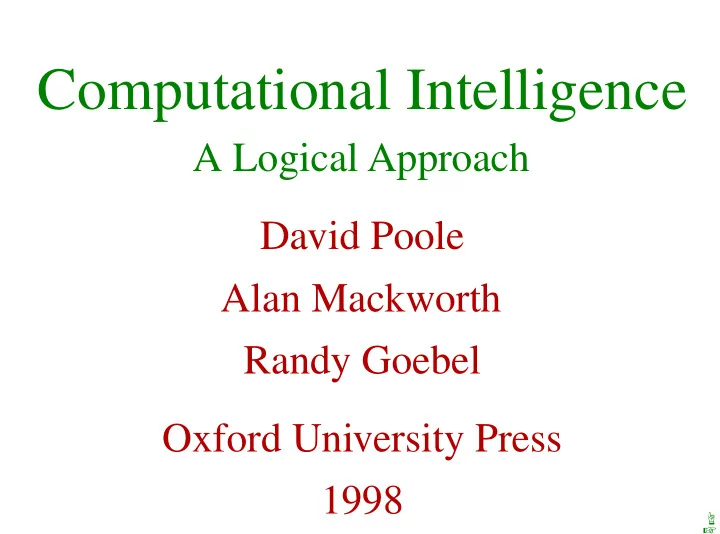

Computational Intelligence A Logical Approach David Poole Alan Mackworth Randy Goebel Oxford University Press 1998 ☞ ☞
Lecture Overview ➤ What is Computational Intelligence? ➤ Agents acting in an environment ➤ Representations ☞ ☞ ☞
What is Computational Intelligence? The study of the design of intelligent agents . An agent is something that acts in an environment. An intelligent agent is an agent that acts intelligently: ➤ its actions are appropriate for its goals and circumstances ➤ it is flexible to changing environments and goals ➤ it learns from experience ➤ it makes appropriate choices given perceptual limitations and finite computation ☞ ☞ ☞
Artificial or Computational Intelligence? ➤ The field is often called Artificial Intelligence. ➤ Scientific goal: to understand the principles that make intelligent behavior possible, in natural or artificial systems. ➤ Engineering goal: to specify methods for the design of useful, intelligent artifacts. ➤ Analogy between studying flying machines and thinking machines. ☞ ☞ ☞
Central hypotheses of CI Symbol-system hypothesis: ➤ Reasoning is symbol manipulation. Church–Turing thesis: ➤ Any symbol manipulation can be carried out on a Turing machine. ☞ ☞ ☞
Agents acting in an environment prior knowledge Agent past experiences Actions goals/values observations Environment ☞ ☞ ☞
Example agent: robot ➤ actions: movement, grippers, speech, facial expressions,… ➤ observations: vision, sonar, sound, speech recognition, gesture recognition,… ➤ goals: deliver food, rescue people, score goals, explore,… ➤ past experiences: effect of steering, slipperiness, how people move,… ➤ prior knowledge: what is important feature, categories of objects, what a sensor tell us,… ☞ ☞ ☞
Example agent: teacher ➤ actions: present new concept, drill, give test, explain concept,… ➤ observations: test results, facial expressions, errors, focus,… ➤ goals: particular knowledge, skills, inquisitiveness, social skills,… ➤ past experiences: prior test results, effects of teaching strategies, … ➤ prior knowledge: subject material, teaching strategies,… ☞ ☞ ☞
Example agent: medical doctor ➤ actions: operate, test, prescribe drugs, explain instructions,… ➤ observations: verbal symptoms, test results, visual appearance… ➤ goals: remove disease, relieve pain, increase life expectancy, reduce costs,… ➤ past experiences: treatment outcomes, effects of drugs, test results given symptoms… ➤ prior knowledge: possible diseases, symptoms, possible causal relationships… ☞ ☞ ☞
Example agent: user interface ➤ actions: present information, ask user, find another information source, filter information, interrupt,… ➤ observations: users request, information retrieved, user feedback, facial expressions… ➤ goals: present information, maximize useful information, minimize irrelevant information, privacy,… ➤ past experiences: effect of presentation modes, reliability of information sources,… ➤ prior knowledge: information sources, presentation modalities… ☞ ☞ ☞
Representations solve problem solution informal interpret represent formal compute output representation Example representations: machine language, C, Java, Prolog, natural language ☞ ☞ ☞
What do we want in a representation? We want a representation to be ➤ rich enough to express the knowledge needed to solve the problem. ➤ as close to the problem as possible: compact, natural and maintainable. ➤ amenable to efficient computation; able to express features of the problem we can exploit for computational gain. ➤ learnable from data and past experiences. ➤ able to trade off accuracy and computation time. ☞ ☞ ☞
Representation and Reasoning System Problem � ⇒ representation � ⇒ computation A representation and reasoning system (RRS) consists of ➤ Language to communicate with the computer. ➤ A way to assign meaning to the symbols. ➤ Procedures to compute answers or solve problems. Example RRSs: ➤ Programming languages: Fortran, C++,… ➤ Natural Language We want something between these extremes. ☞ ☞
Recommend
More recommend